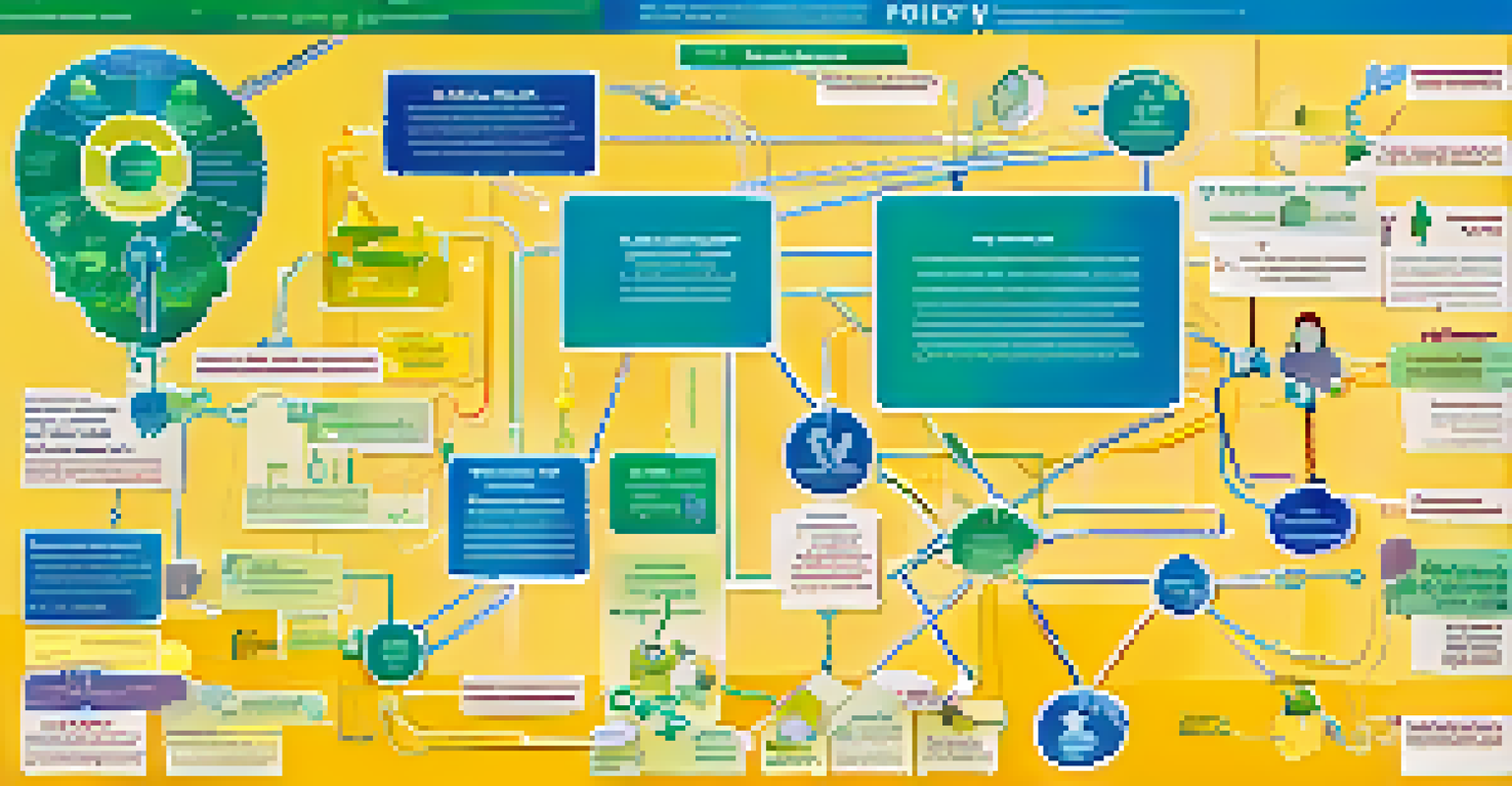Evaluating the Impact of Healthcare Policy on Economics

Understanding Healthcare Policy and Its Economic Context
Healthcare policy refers to decisions, goals, and actions that shape the healthcare system. It includes regulations, laws, and guidelines that affect how healthcare is delivered and funded. By understanding these policies, we can better grasp their potential impact on economic factors like employment, productivity, and overall economic growth.
Health is a human right, not a privilege to be purchased.
For instance, policies that expand access to healthcare can lead to healthier populations, which often translates to increased productivity. When people receive necessary medical care, they tend to miss fewer workdays and can contribute more effectively to the economy. Thus, analyzing healthcare policy is crucial for understanding its broader economic implications.
Furthermore, the economic context, including factors like GDP and unemployment rates, can influence healthcare policy decisions. Policymakers must consider how changes in the economy impact healthcare access and quality, creating a dynamic interplay between economic indicators and healthcare outcomes.
The Financial Burden of Healthcare on Individuals and Economies
Healthcare costs can impose a significant financial burden on individuals, families, and even the national economy. High out-of-pocket expenses and insurance premiums can lead to financial strain, preventing many from seeking necessary medical care. This situation can result in a cycle of poor health and increased economic hardship.

Moreover, when healthcare costs escalate, they can affect businesses too. Employers often face higher insurance premiums, which may lead to reduced hiring or lower wages for employees. These economic pressures can stifle growth and innovation within various industries, ultimately impacting the overall economy.
Healthcare Policy Affects Economy
Decisions in healthcare policy can significantly influence economic factors like productivity, employment, and overall economic growth.
In contrast, effective healthcare policies that control costs can alleviate this burden. By promoting preventive care and managing chronic diseases, these policies can reduce the financial strain on both individuals and the economy. This, in turn, can foster a healthier workforce that drives economic progress.
The Role of Government in Shaping Healthcare Economics
The government plays a pivotal role in shaping healthcare economics through policy-making and funding. By establishing regulations and funding mechanisms, they influence how healthcare is delivered and financed. This involvement can have far-reaching implications for the overall economy and individual health outcomes.
The greatest wealth is health.
For example, government-funded programs like Medicare and Medicaid provide essential healthcare services to millions of Americans, significantly impacting both the healthcare sector and the economy. These programs not only ensure access to care but also create jobs in the healthcare industry, contributing to economic growth.
However, government interventions can also lead to unintended consequences. For instance, overly restrictive policies may stifle innovation in healthcare technologies or limit competition, ultimately affecting the quality and cost of care. Thus, balancing government involvement in healthcare is vital to fostering a healthy economy.
Evaluating the Effectiveness of Healthcare Policy
Evaluating the effectiveness of healthcare policy is essential to understanding its economic impact. Policymakers utilize various metrics, such as health outcomes, access to care, and cost-effectiveness, to assess how well policies meet their intended goals. This evaluation process helps identify areas for improvement and guides future policy decisions.
For example, if a healthcare policy aimed at reducing hospital readmission rates proves successful, it can be expanded or adjusted to further benefit the economy. On the other hand, ineffective policies may require reevaluation or replacement, ensuring that resources are allocated efficiently and effectively.
Cost Burden Impacts Individuals
High healthcare costs can create financial strain on individuals and businesses, leading to poorer health outcomes and stunted economic growth.
Additionally, stakeholder feedback, including input from healthcare providers and patients, is crucial in evaluating policy effectiveness. Listening to those directly affected by these policies can provide valuable insights and help create more responsive and impactful healthcare solutions.
The Intersection of Healthcare Policy and Economic Inequality
Healthcare policy significantly intersects with economic inequality, as access to quality care often varies based on socioeconomic status. Individuals from lower-income backgrounds may face barriers to accessing healthcare, leading to poorer health outcomes and exacerbating existing economic disparities. This relationship highlights the need for policies that promote equity in healthcare access.
For instance, policies that expand Medicaid or provide subsidies for low-income individuals can help bridge this gap, ensuring that everyone has access to necessary medical services. These initiatives not only improve individual health but can also contribute to a more equitable economy by fostering a healthier workforce.
Moreover, addressing economic inequality through healthcare policy can have a ripple effect on society. By improving health outcomes in disadvantaged communities, we can enhance overall community well-being, reduce poverty rates, and stimulate economic growth. Thus, equitable healthcare policies are essential for building a more just and prosperous economy.
The Future of Healthcare Policy and Economic Development
As we look toward the future, the relationship between healthcare policy and economic development will continue to evolve. Emerging technologies, changing demographics, and shifting economic landscapes will all influence how healthcare is delivered and financed. Policymakers must stay agile and responsive to these changes to optimize health outcomes and economic growth.
For example, the rise of telemedicine has transformed healthcare delivery, making it more accessible and efficient. Policymakers must consider how to integrate these innovations into existing healthcare frameworks, ensuring that all populations benefit from advancements in technology.
Equity in Healthcare is Crucial
Policies that promote equitable access to healthcare can help reduce economic disparities and foster a healthier, more productive workforce.
Moreover, as global health challenges, such as pandemics, arise, the need for resilient healthcare systems becomes paramount. Investments in public health infrastructure and preventive care will be crucial in safeguarding both health and economic stability in the future. Ultimately, a proactive approach to healthcare policy will be key to fostering sustainable economic development.
Conclusion: The Interconnectedness of Healthcare and Economics
In conclusion, the evaluation of healthcare policy's impact on economics reveals a complex and interconnected relationship. From individual financial burdens to government interventions, the effects of healthcare policy ripple throughout the economy. Understanding these dynamics is essential for policymakers, businesses, and individuals alike.
As we move forward, it is crucial to prioritize policies that promote access, equity, and innovation in healthcare. By doing so, we can create a healthier population that contributes positively to the economy, ultimately benefiting society as a whole.

The ongoing dialogue surrounding healthcare policy and economics will shape the future of our healthcare system and its impact on economic development. By recognizing the importance of this relationship, we can work towards a more sustainable and equitable future for all.